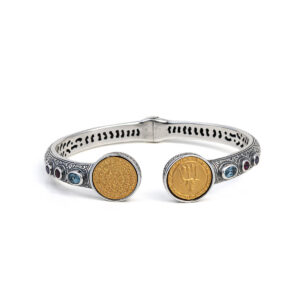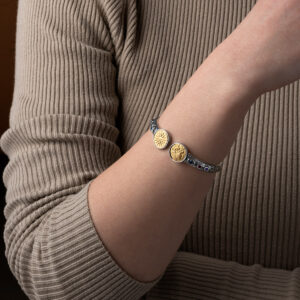The Phaistos Disc is a disk of fired clay from the Minoan palace of Phaistos on the island of Crete. Now, the island of Crete is part of modern Greece. The disc was discovered in 1908 by the Italian archaeologist Luigi Pernier in the Minoan palace-site of Phaistos. While it is not clear that it is a script, most attempted decipherments assume that it is; most additionally assume a syllabary, others an alphabet or logography or a calendar.
Phastos Disc Cuff Bracelet Sterling Silver Gold Plated
A bracelet inspired by the ancient disk found in Phaistos.
Made of 925⁰ sterling silver and gold plated.
Handmade in Greece.
Explore Phaistos Disc Collection
History
The Phaistos Disc is a disk of fired clay from the Minoan palace of Phaistos on the island of Crete. Now, the island of Crete is part of modern Greece. The disc was discovered in 1908 by the Italian archaeologist Luigi Pernier in the Minoan palace-site of Phaistos. While it is not clear that it is a script, most attempted decipherments assume that it is; most additionally assume a syllabary, others an alphabet or logography or a calendar.
In Greek mythology, the Minotaur is a mythical creature portrayed in Classical times with the head and tail of a bull and the body of a man. He dwelt at the center of the Labyrinth, which was an elaborate maze-like construction designed by the architect Daedalus and his son Icarus, on the command of King Minos of Crete. The Minotaur was eventually killed by the Athenian hero Theseus.
Labrys is, according to Plutarch, Minoan word for the double headed axe called in Greek πέλεκυς (pélekus). In ancient Crete, the double axe was an important sacred symbol of the Minoan religion. In Crete it never accompanies male gods, but always female goddesses. It seems that it associated with the worship of Mother Earth or Great Goddess.




